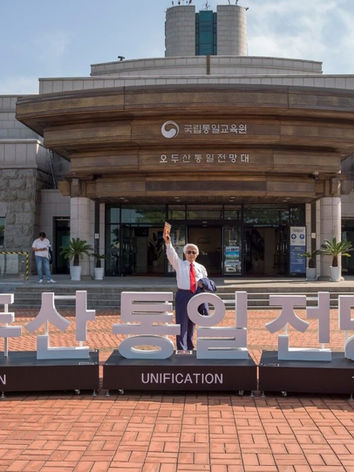
About The Book
Having studied, worked, and traveled throughout Asia and the United States for 40 years, the author, Dr. Suh, outlines in Kwang Suh’s 4 Measures for the Unification of the Korean Peninsula a plan that when implemented, will have a profound impact on the unification between Korean refugees, brothers, sisters, and friends around the world.
It has been 79 years since one Korea was split into two. The only dream of South Koreans and North Koreans is unification. Therefore, the separated families and divided Korean Peninsula should be reunited.
The thesis throughout this book is not based upon ideological or political doctrines, but on the notion of “Bread and Freedom”, which is the pure essence of human survival.
The author clearly presents four concrete and realistic measures for the unification of the Korean Peninsula. He also points out that “the key to the peaceful and autonomous unification of the Korean Peninsula is the economic revival of North Korea.”
Note
This book is written in the following 6 languages and 8 versions:
-
English / 영어
-
Korean / 한국어 (pure Korean characters and within Chinese characters)
-
Chinese / 中國語 (traditional and 徐光河的韩半岛统一四大方案)
-
Japanese / 徐光河の韓半島統一四大方案
-
Russian/ЧЕТЫРЕ ПЛАНЫ ДЛЯ ОБЪЕДИНЕНИЯ КОРЕЙСКОГО ПОЛУОСТРОВА
-
Spanish/Los cuatro grandes caminos de Kwang Suh para la reunificación de Corea

About the Author
The author, Dr. Kwang Suh lived on North Korean soil until 1945 with his parents, three older brothers and a just born younger sister. However, after a while, his family managed to escape to the south, but unfortunately, he lost his father, who was wounded in the process of escaping south from the 38th parallel, northern part of Korea. Hunger, isolation, and despair plagued him for years, especially after his father died.
In the 1960s and early 1970s, South Korea was run by a corrupt and strict military dictatorship. Anyone who was against this dictatorship was subject to severe punishment including capital punishment. Dr. Suh was able to go to college and postgraduate schooling with hard work and perseverance. He graduated with honors from the graduate law school in Seoul, Korea and got his first job as a law school lecturer. As a university professor, he fought for democracy against the military dictatorship and advocated for his published book, White Collar Crime in Korea, which exposed abuses of power and corruption among the ruling elite. Eventually, he could not endure the whirlwind of condemnation of the military coup dictatorship, and finally he was helplessly expelled by the South Korean government.
Kwang H. Suh
In 1971, after hiding and secretly watching the North Korean opera “The Maiden Who Sells Flowers (꽃 파는 처녀)” on a telephone pole advertising in Osaka, Japan and in 1972, when he went back and forth to the library of the University of Tokyo, he met on the subway train the so-called “Bbal Gaeng E” (North Korean communists) of the female students at Korea University in Tokyo (동경 조선대학교) dressed in traditional Korean costumes of white jackets and black skirts, who were speaking freely and frankly in Korean, but he could not talk to them or speak a single word of Korean language with them. Because it was a violation of “anti-communist law” in South Korea. After that time, he began to germinate and ruminate about the “need and necessary importance for his own language of Korean and the need to work for, “reunification of the Korean Peninsula” in a country with the same culture and blood.
The author, Dr. Suh said, “My hope is that this book will provide a pathway for the Unification of the Korean Peninsula”.

Our Gallery




















